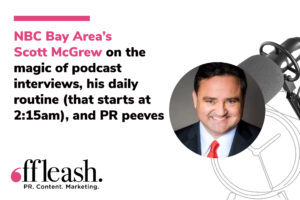NBC Bay Area’s Scott McGrew on the magic of podcast interviews, his daily routine (that starts at 2:15am), and PR peeves

If you live in the Bay Area and enjoy watching the news over your morning cup of coffee, chances are Scott McGrew is a familiar face. For the past 25+ years, he’s served as a reporter and news anchor for NBC Bay Area, as well as the host of Press:Here, a televised weekly roundtable about venture capital and entrepreneurship.
More recently, Scott has branched into the exciting world of podcasting as the host of Sand Hill Road. On his podcast, Scott explores all-things venture capital, and gets up close and personal with the pivotal people who are backing and creating the next wave of technology in Silicon Valley.
Needless to say, Scott is a wealth of information, and we were thrilled to connect with him and pick his brain about everything from his favorite interviews, to his daily routine, to how PR professionals can best work with him.
Here are the highlights:
Describe your favorite interviews from the past year. What made them stand out?
My favorite interviews from the past year have taken place on my podcast, Sand Hill Road. By nature, podcasting provides a unique opportunity to have long-form conversations—unlike broadcast—where you can really delve into the struggles people have faced, what motivates them, and how factors like race, gender, etc. have impacted someone’s journey.
One such conversation was with Hooman Radfar, where we discussed how having an unusual name affected him growing up. I could relate because kids in grade school would call me “Mr. Magoo” due to my last name being McGrew. Additionally, Rory O’Driscoll and I connected on the joys of being well-established in your career in your mid-50s: You’ve put in the 10K+ hours it takes to be proficient, you’re well-compensated, and you no longer have to ask for permission—and that’s a beautiful thing.
It’s not that you can’t cover these topics on TV, but you need more context—and therefore more time—to dig into them sufficiently and begin to get to know someone.
What was your most epic interview experience of all time?
I had the opportunity to interview former U.S. President Gerald Ford many years ago. It was a full-circle moment for me because I’d first met him when I was in grade school during his presidential term, and during our interview I got to tell him the story of how he’d signed an autograph for me back in 1976.
What critical elements make a great broadcast story? What about a podcast interview?
TV is a visual medium, so it’s absolutely necessary to have visuals to accompany your story—it’s always the first thing I ask for. And for PR folks: I also need your spokesperson’s buy-in regarding the direction of our conversation. It can be tempting for founders to default to talking about their company and its offerings, but it’s critical to stick to the agreed-upon topic or angle we’ll be discussing.
When it comes to podcasts, it’s all about showcasing the guest’s personality and discovering their backstory. Since we have more time to work with, the interview format is less rigid and there’s no telling exactly where the conversation will go.
What does your typical workday look like?
I wake up at 2:15am, arrive at work at 4:15am, and I’m on air from 5-7am. At 8am we do a streaming newscast, and I generally wrap up by 9am to begin working on the Sand Hill Road podcast until noon. In case you’re wondering, yes, I am in bed by 6pm each night. When I tell people what time I go to bed I’m usually met with shock, but I love my schedule: I can get on the golf course most days of the week, the grocery store is empty whenever I shop, and I never have to drive in rush-hour traffic.
Given your packed schedule, what is the best way for PR people to work with you? Is there anything PR people do that drives you crazy?
Since my job is to ask questions, PR people should ensure they’re presenting an idea that’s compelling enough to immediately inspire follow-up questions. If I read a pitch and can’t think of a single question I’d ask during an interview on the topic, it’s an automatic “no.” As mentioned, including supporting visuals in a pitch is also vital. When it comes to pet peeves, I understand all PR folks have a job to do, but there’s no need to follow up on a pitch three times—if the story is a good fit, you’ll hear back from me.
It’s no secret that the media landscape has undergone significant change in recent years. What’s your take on these shifts and what are you seeing in your role?
Local TV and morning news are still doing quite well—people have a habit of switching on the news each morning to learn about what’s happened overnight. But I’m cognizant of the fact that every year fewer people are watching television. I’m continually seeing an influx of younger people in the newsroom, which is great. They’re driven, talented, and have a lot to contribute.
Follow Scott on X at @ScottMcGrew and be sure to tune into his podcast Sand Hill Road